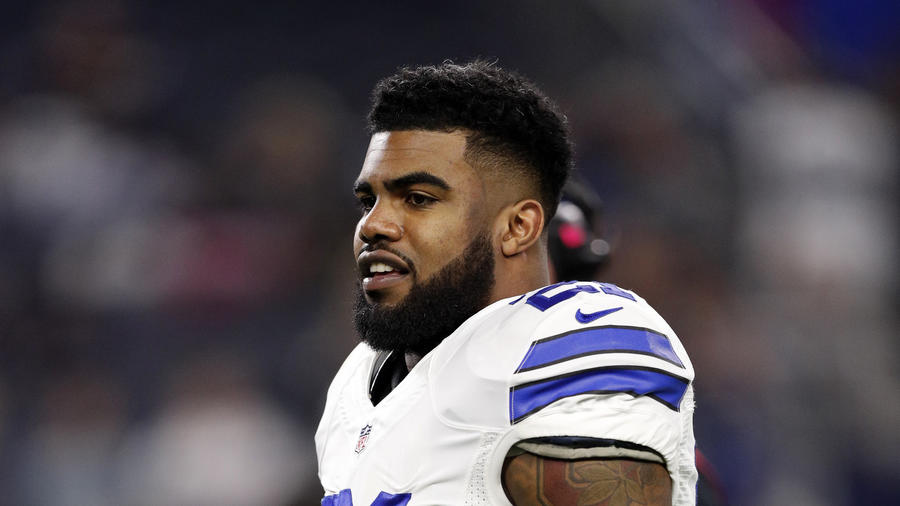
Like roster cuts on Labor Day weekend and the Thursday night kickoff, nothing heralds the start of a new NFL season like another court battle between the league and its players’ union.
For the fifth time since the collective bargaining agreement took effect in 2011, the season begins under the cloud of the NFL and the union sniping at each other via court documents, social media and grandiose statements. It’s a wholly predictable and exasperating routine, mostly because it changes nothing.
Except the public perception of the player involved, whose reputation the NFL and NFL Players Association will happily destroy while they throw rocks at each other rather than figuring out a way to settle their disagreements like adults.
Bountygate, Ray Rice, Greg Hardy, Adrian Peterson, Tom Brady and now Ezekiel Elliott. It’s the same nonsense year after year and, no matter who wins in court, the NFL and NFLPA both wind up losers.
Take Elliott, whose six-game suspension for violating the league’s personal conduct policy was upheld by an arbitrator Tuesday night while the Dallas Cowboys running back was in court for a hearing on a temporary restraining order the union requested in anticipation of said arbitrator’s ruling. Though a ruling on the temporary restraining order is expected by Friday, Elliott is eligible to play in the Cowboys’ season opener Sunday against the New York Giants.
Domestic violence allegations are rarely neat and tidy, and this one is no different. Elliott’s ex-girlfriend has been seen by some as an unsympathetic figure. But an NFL investigation said she provided photos documenting the bruises she suffered, and Elliott’s own words show an alarming disregard for women.
It’s an ugly case, but the league’s dysfunctional approach to discipline has made it even uglier.
NFL Commissioner Roger Goodell is all-powerful in disciplinary matters involving personal conduct because that’s the way the owners want it. (Jerry Jones might be rethinking that these days but, trust me, his second-guessing will be fleeting.) Sure, Goodell is heavy-handed and inconsistent and, until the Elliott decision, had a troubling tendency to be reactionary.
But the NFL is a multi-billion-dollar brand that gets more valuable by the year, and the owners aren’t about to let it be tarnished by the bad deeds of a very small number of players.
The NFLPA, meanwhile, caved when it had the chance to limit Goodell’s power during those CBA negotiations six years ago.
Oh, the Pittsburgh Steelers tried to warn their fellow players, voting as a group not to approve the CBA in large part because of their concerns about Goodell. But players would have had to sit out games to get the owners to agree to third-party discipline and, when push came to shove, they deemed paychecks more important than principles.
So now the NFLPA cries to the courts about personal conduct decisions, hoping the legal system will do what it would not.
It sets up a vicious cycle where the NFLPA will use anything at its disposal to make its case – or, muddy it, as in the Elliott matter. Hence those “leaks” of disparaging information about Elliott’s accuser, which Goodell had already taken into account when handing down the suspension.
In turn, to prove the harsh discipline was warranted, the NFL heaps dirt on the player, star stature be damned.
Great a quarterback as Brady is, one lasting memory some people will have of him is that curiously destroyed cell phone. Elliott has emerged as one of the league’s brightest young stars, endearing himself to fans far beyond Dallas with his half-shirts and touchdown celebration that used an inflatable Salvation Army kettle as a prop. But it’s going to be impossible to watch him now and not see the photos of his bruised ex-girlfriend or recall his admission of drug use at Ohio State.
All of this could be handled better, more effectively if the NFL used a neutral party, agreed upon by both sides, to handle personal conduct issues. The existing CBA doesn’t expire until the end of the 2020 season, but there’s no reason the league and union can’t hammer out a side agreement on discipline now.
It would require the NFLPA to acknowledge that some misdeeds have no excuse and deserve no defense, and the NFL to acknowledge that collaboration is not a sign of weakness. But those are small concessions to make to bring an end to the legal wrangling, a tired tradition in which no one’s ever going to win.
By Nancy Armour
This article was republished with permission from the original author and 2015 Ronald Reagan Media Award recipient, Nancy Armour, and the original publisher, USA Today. Follow columnist Nancy Armour on Twitter @nrarmour.